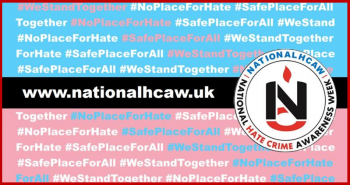Here we are at the beginning of Hate crime Awareness week, twenty-two years on from The MacPherson Report, a ground breaking report into the murder of Stephen Lawrence by racists and the subsequent lack of prosecution of the killers due to institutional racism.

The House of Commons Home Affairs committee on sexual orientation has produced a report looking at what has changed in the intervening two decades. I am pleased to see that there is recognition that some things are better however there is still much to be concerned about.
The report itself does not in my view tackle the needs of BAME/BME people in a holistic way. Evidence was taken from young black people in London, which was shocking, indicating their lack of trust in the police force and therefore the unlikelihood of them considering becoming police officers. This is a vital need given the lack of real representation of BAME/BME officers in forces around the country. The report stated, ‘The Peel principles that have underpinned British policing for nearly two hundred years are based on the understanding that the police are the public and the public are the police. These principles apply to everyone: it cannot be the case that they apply to some communities and not others based on the colour of people’s skin. As long as police forces remain so unrepresentative of local communities these vital principles are being undermined.’
However, the report does not effectively look at the wider protected characteristics of BAME/BME people. I was deeply disappointed that little awareness was explored or expressed in the diversity of experience of women, disabled people, those who have undergone gender reassignment, those married or civil partnered, pregnant, in the LGBT+ community, nor of class and/or regional difference. What was clear was that victims of hate crime were less satisfied with the way they were treated compared to other crimes. So the report said ‘The Home Office must commission research into the reasons behind lower levels of confidence among hate crime victims and ensure that figures on the victims can be broken down by monitored hate crime strand. Police forces also must improve the recording of hate crime offences so that data is accurate and consistent and must collect better information’…….
‘the failure of successive governments to require data on confidence to be collected at a local force level by ethnicity, shows that increasing trust and confidence in policing in the Black community is not being treated as a policing priority or as a Ministerial priority today.
We need this government to take all forms of hate crime seriously and be given the tools and resources to do that. Online hate crime is on the increase and it is blatantly clear that the police do not have the skills, training or resources to deal with it effectively as the report says, ‘Our greatest concern going forward is that the Government and police forces are being left behind by the rise of online racism and racist crimes as the rise of social media means patterns of race hate crime are changing. Currently the police do not have the digital capacity, training or systems in place to be able to keep up with monitoring, investigating and charging serious cases of racist and hate crimes committed online. Social media companies and platforms need to do far more to tackle online racist abuse’
I would add that all forms of online abuse need tackling at this moment in time – anti-trans abuse is a particular worry, with the negative atmosphere in the country supported by some media to be particularly poisonous.
Schools need particular support and awareness in dealing with hate crime, often erroneously called bullying. Schools hopefully keep a log of all reported incidents and how they were dealt with. I am always suspicious of schools and indeed councils that deliver low or nil reports of hate crime. This smacks of a lack of confidence in reporting such issues, usually because the victims don’t feel anything constructive happens to support them. They are often seen as the perpetrators, not as the victims they actually are. All too often a victim having to deal with hate crime on their own, snaps, and it is their retaliatory behaviour that is noticed and punished, not the provocation that triggered it.
Hate Crime Awareness Week, along with the many other designated days and months throughout the year, is a perfect opportunity to discuss bigotry, analyse it then educate out that prejudice – usualising all the protected characteristics across the National Curriculum. Thus we will enable pupils to recognise and see as every day the diversity of the population and understand the appropriate language to describe everyone.
We at Schools OUT UK have many free resources to enable such work see www.the-classroom.org.uk and www.lgbtplushistorymonth.co.uk.
Professor Emeritus Sue Sanders
Chair, Schools OUT United Kingdom
(member of the Independent Advisory Group to the NPCC, the National Police Chiefs Council and the APCC (the association of police and crime commissioners))

